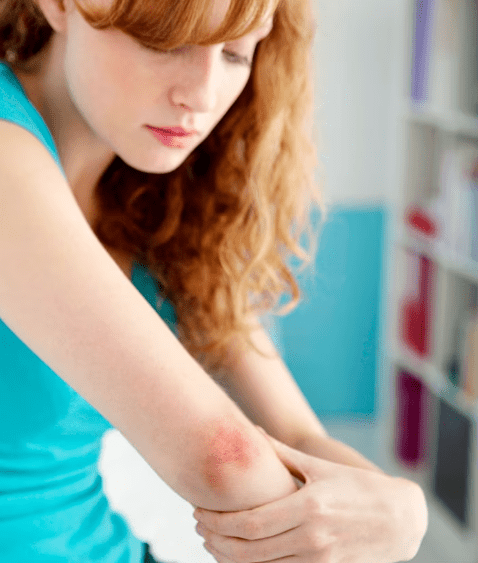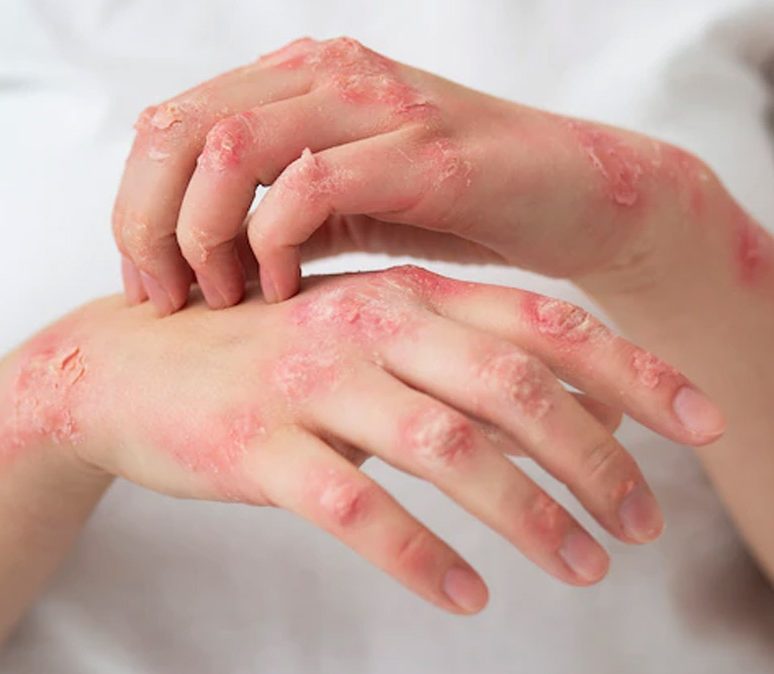Psoriasis is a chronic (long-lasting) disease in which the immune system becomes overactive, causing skin cells to multiply too quickly. Patches of skin become scaly and inflamed, most often on the scalp, elbows, or knees, but other parts of the body can be affected as well. Scientists do not fully understand what causes psoriasis, but they know that it involves a mix of genetics and environmental factors.
The symptoms of psoriasis can sometimes go through cycles, flaring for a few weeks or months followed by periods when they subside or go into remission. There are many ways to treat psoriasis, and your treatment plan will depend on the type and severity of disease. Mild psoriasis can often be successfully treated with creams or ointments, while moderate and severe psoriasis may require pills, injections, or light treatments. Managing common triggers, such as stress and skin injuries, can also help keep the symptoms under control.

Psoriasis is an immune-mediated disease, which means that your body’s immune system starts overacting and causing problems. If you have psoriasis, immune cells become active and produce molecules that set off the rapid production of skin cells. This is why skin in people with the disease is inflamed and scaly. Scientists do not fully understand what triggers the faulty immune cell activation, but they know that it involves a combination of genetics and environmental factors. Many people with psoriasis have a family history of the disease, and researchers have pinpointed some of the genes that may contribute to its development. Many of them play a role in the function of the immune system.
Symptoms of psoriasis vary from person to person, but some common ones are:
Some patients have a related condition called psoriatic arthritis, which can be characterized by stiff, swollen, or painful joints; neck or back pain; or Achilles heel pain. If you have symptoms of psoriatic arthritis, it is important to see your doctor soon because untreated psoriatic arthritis can lead to irreversible damage.
The symptoms of psoriasis can come and go. You may find that there are times when your symptoms get worse, called flares, followed by times when you feel better.


In an older study, participants each bathed one of their arms with psoriasis symptoms in a solution containing 5% Dead Sea salt for 15 minutes at a time over 6 weeks. They bathed the other arm in tap water during the same period for comparison.
The arms submerged in Dead Sea salt water showed improved skin hydration and reduced roughness and redness after 6 weeks. This may be due to the magnesium salts enhancing the binding of water into the skin.
Another older studyTrusted Source from 2001 evaluated the effectiveness of Dead Sea salt baths compared with common table salt baths over 3 weeks to treat psoriasis flares.
There was a greater reduction in symptoms for the group treated with Dead Sea salt baths than those bathing with common table salt.

Psoriatic arthritis (PsA) is a chronic, inflammatory disease of the joints and entheses, where tendons and ligaments connect to bone. Like psoriasis, PsA is associated with related health conditions (comorbidities).
It can start at any age and may affect children. The disease often appears between the ages of 30 and 50. For many people, it starts about 10 years after psoriasis develops, but some develop PsA first or without ever developing or noticing psoriasis.
Though there is no cure, a growing range of treatments are available to help stop the disease progression, lessen pain, protect joints, and preserve range of motion. If you have or suspect you may have PsA, it is extremely important to work with a rheumatologist (a doctor who specializes in how the immune system affects joints, bones, and muscles) to find the right treatment plan. For help finding a rheumatologist near you, contact the Patient Navigation Center.
Early recognition, diagnosis, and treatment of PsA can prevent or limit the extensive joint damage that can occur in later stages of the disease.
To evaluate the effectiveness of balneotherapy (mud packs and sulfur baths) on patients with psoriasis and psoriatic arthritis (PsA).


One hundred and sixty-six patients with psoriasis and PsA were treated at the Dead Sea for a period of 3 weeks. The patients were divided into 2 groups. Both groups had the regular regimen of bathing in Dead Sea water and exposure to the sun's ultraviolet rays. The study group, which consisted of 146 patients also was treated with mud packs and sulfur baths. The control group, which had no additional therapy, consisted of 20 patients. The main clinical variables assessed were duration of morning stiffness, grip strength, activities of daily living, subjective patient assessment of disease severity, number of active joints, number of effluent joints. Ritchie index, psoriasis area and severity index score, cervical, thoracic, and lumbar spine pain and limitations of movement.
Statistically significant improvement was found in most variables in both groups. However, better results were observed in the study group. In 2 variables, reduction of spinal pain and range of movement in the lumbar spine, significant improvement (p < 0.001 and p = 0.022, respectively) was observed in the study group only.


Treatment of psoriasis and PsA at the Dead Sea area is very efficacious and the addition of balneotherapy can have additional beneficial effects on patients with PsA. Other controlled studies with longer followup periods are needed to verify our results.
Dead Sea Spa Resort
Typically replies within minutes
Any questions related to The Psoriasis?
WhatsApp Us
🟢 Online | Privacy policy
WhatsApp us